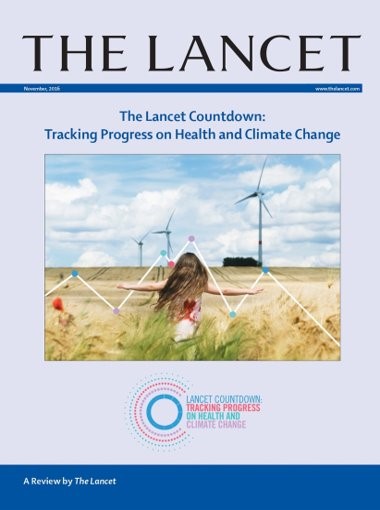Report of The Lancet Countdown on Health and Climate Change, 2024

- 30 Oct 2024
In News:
The 2024 edition of The Lancet Countdown on Health and Climate Change presents critical insights into the intersection of health and climate change.
Key Findings from the 2024 Report
- Air Pollution and Mortality in India:
- In 2021, air pollution was responsible for 1.6 million deaths in India.
- Fossil fuels (coal and liquid gas) were identified as major contributors, accounting for 38% of these deaths.
- India was ranked as the second-highest emitter of PM2.5 globally in 2022, contributing 15.8% of consumption-based and 16.9% of production-based PM2.5 emissions.
- Impact of Heat Stress:
- In 2023, India experienced 2400 hours (or 100 days) of moderate to high heat stress, particularly during light outdoor activities like walking.
- Heatwaves have become more frequent, with adults over 65 years experiencing 8.4 heatwave days per year, a 58% increase from 1990-1999.
- This increased heat exposure has led to a loss of 181 billion labor hours globally, translating into an economic loss of approximately $141 billion.
- Global and National Trends in Air Pollution:
- PM2.5 is particularly hazardous because it is fine enough to enter the lungs and bloodstream, leading to severe health risks like respiratory and cardiovascular diseases.
- Nitrogen Dioxide (NO?), Sulphur Dioxide (SO?), Carbon Monoxide (CO), and Ozone (O?) were identified as other pollutants contributing to poor air quality in India.
- Health Impact of Extreme Weather:
- The 2023 heatwave was one of the hottest years on record, exacerbating health risks worldwide, especially for the elderly.
- Droughts and heatwaves also contributed to a rise in food insecurity, affecting millions globally.
- Disease Transmission and Climate Change:
- Dengue transmission potential rose by 85% from 1951-1960 to 2014-2023.
- Coastal areas suitable for the spread of Vibrio pathogens, which cause cholera, expanded by 23%, affecting over 210 million people.
- Health Effects of Fossil Fuel Pollution:
- Continued reliance on fossil fuels worsens air quality, leading to health problems such as respiratory diseases, cardiovascular issues, and adverse pregnancy outcomes.
Government Efforts to Tackle Air Pollution in India
- National Clean Air Programme (NCAP):
- NCAP is a national strategy to reduce air pollution across India, with specific action plans for 131 non-attainment cities. The initiative is supported through various central government schemes such as:
- Swachh Bharat Mission (Urban)
- Atal Mission for Rejuvenation and Urban Transformation (AMRUT)
- Smart City Mission
- Faster Adoption and Manufacturing of Hybrid and Electric Vehicles (FAME-II)
- NCAP is a national strategy to reduce air pollution across India, with specific action plans for 131 non-attainment cities. The initiative is supported through various central government schemes such as:
- Bharat Stage VI (BS-VI) Emission Norms:
- BS-VI standards aim to significantly reduce vehicular pollution, lowering permissible limits for NOx and particulate matter (PM) emissions from vehicles.
- System of Air Quality and Weather Forecasting and Research (SAFAR):
- SAFAR measures air quality and provides forecasts for metropolitan cities based on real-time data, helping authorities take preventive actions.
- Promotion of Renewable Energy:
- India achieved a record 11% of electricity from renewable energy in 2022. However, 71% of India’s electricity still comes from coal, underscoring the need for a faster transition to cleaner energy sources.
